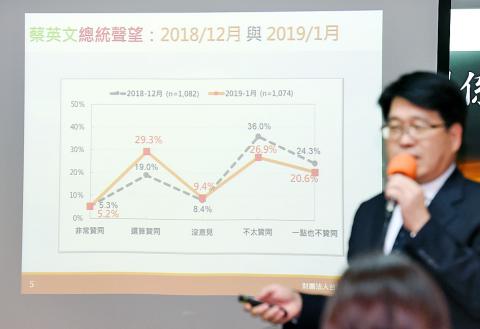President Tsai Ing-wen’s (蔡英文) approval rating increased by more than 10 percentage points in the wake of Chinese President Xi Jinping’s (習近平) Jan. 2 speech about Taiwan, a Taiwanese Public Opinion Foundation poll released yesterday found.
Tsai’s approval rating rebounded from a record low of 24.3 percent to 34.5 percent, her highest since June last year, because of her defiant response to Xi’s speech, foundation chairman Michael You (游盈隆) told a Taipei news conference.
Her disapproval rating also declined by 12.8 percentage points to 47.5 percent from a record high of 60.3 percent, You said.

Photo: Liao Chen-huei, Taipei Times
“This was a dramatic change and the Chinese factor was the only reason. Xi did Tsai a great favor, although it was unintended,” he said.
Asked whether they were happy with Tsai’s cross-strait policies, 43.2 percent of respondents said they were, while 49 percent said they were not, the poll found.
Compared with a month before, those who approved of Tsai’s cross-strait policies increased by 18 percentage points, while those who disapproved of them fell by 17 percentage points.
The jump in Tsai’s approval rating coincided with a marked increase in the number of respondents supporting Taiwan independence, You said.
Asked whether Taiwan should become independent or unify with China in the future, 47. 5 percent of respondents said they support independence, 22.7 percent said they support unification and 18.5 percent preferred the “status quo,” the poll showed.
It was the most support for independence since September 2017, the foundation said.
Support for independence increased by 12.4 percentage points from last month’s poll, while supporters of unification and the “status quo” fell by 1.1 and 10.7 percentage points respectively.
“The figures suggest more people who previously supported maintaining the ‘status quo’ now support independence because of Xi’s speech, while the number of people supporting unification remain about the same,” You said.
Questions related to Xi’s speech yielded similar results, with the majority of respondents supporting independence and one-quarter supporting unification, he said.
Asked if they agreed with Xi that “the mainland and Taiwan belong to one China,” 24 percent said they agreed, while 68.3 percent disagreed, the poll found.
Asked if they support peaceful unification and China’s “one country, two systems” framework, 24.6 percent said yes, compared with 67.1 percent who opposed it.
In addition, 19.2 percent of respondents said Taiwan needs to rely on the so-called “1992 consensus” for survival, while 67.5 percent disagreed.
Former premier William Lai (賴清德) received a high approval rating of 53.2 percent, an increase of 5.8 percentage points over a similar poll in September last year, You said.
Asked whether they have confidence in the new Cabinet led by Premier Su Tseng-chang (蘇貞昌), 38.7 percent of respondents said they did, while 52 percent said they did not, the poll found.
The poll, conducted on Monday and Tuesday last week, collected 1,074 valid samples.

A preclearance service to facilitate entry for people traveling to select airports in Japan would be available from Thursday next week to Feb. 25 at Taiwan Taoyuan International Airport, Taoyuan International Airport Corp (TIAC) said on Tuesday. The service was first made available to Taiwanese travelers throughout the winter vacation of 2024 and during the Lunar New Year holiday. In addition to flights to the Japanese cities of Hakodate, Asahikawa, Akita, Sendai, Niigata, Okayama, Takamatsu, Kumamoto and Kagoshima, the service would be available to travelers to Kobe and Oita. The service can be accessed by passengers of 15 flight routes operated by

GIVE AND TAKE: Blood demand continues to rise each year, while fewer young donors are available due to the nation’s falling birthrate, a doctor said Blood donors can redeem points earned from donations to obtain limited edition Formosan black bear travel mugs, the Kaohsiung Blood Center said yesterday, as it announced a goal of stocking 20,000 units of blood prior to the Lunar New Year. The last month of the lunar year is National Blood Donation Month, when local centers seek to stockpile blood for use during the Lunar New Year holiday. The blood demand in southern Taiwan — including Tainan and Kaohsiung, as well as Chiayi, Pingtung, Penghu and Taitung counties — is about 2,000 units per day, the center said. The donation campaign aims to boost

ENHANCING EFFICIENCY: The apron can accommodate 16 airplanes overnight at Taoyuan airport while work on the third runway continues, the transport minister said A new temporary overnight parking apron at Taiwan Taoyuan International Airport is to start operating on Friday next week to boost operational efficiency while the third runway is being constructed, the Ministry of Transportation and Communications said yesterday. The apron — one of the crucial projects in the construction of the third runway — can accommodate 16 aircraft overnight at the nation’s largest international airport, Minister of Transportation and Communications Chen Shih-kai (陳世凱) told reporters while inspecting the new facility yesterday morning. Aside from providing the airport operator with greater flexibility in aircraft parking during the third runway construction,

American climber Alex Honnold is to attempt a free climb of Taipei 101 today at 9am, with traffic closures around the skyscraper. To accommodate the climb attempt and filming, the Taipei Department of Transportation said traffic controls would be enforced around the Taipei 101 area. If weather conditions delay the climb, the restrictions would be pushed back to tomorrow. Traffic controls would be in place today from 7am to 11am around the Taipei 101 area, the department said. Songzhi Road would be fully closed in both directions between Songlian Road and Xinyi Road Sec 5, it said, adding that bidirectional traffic controls would